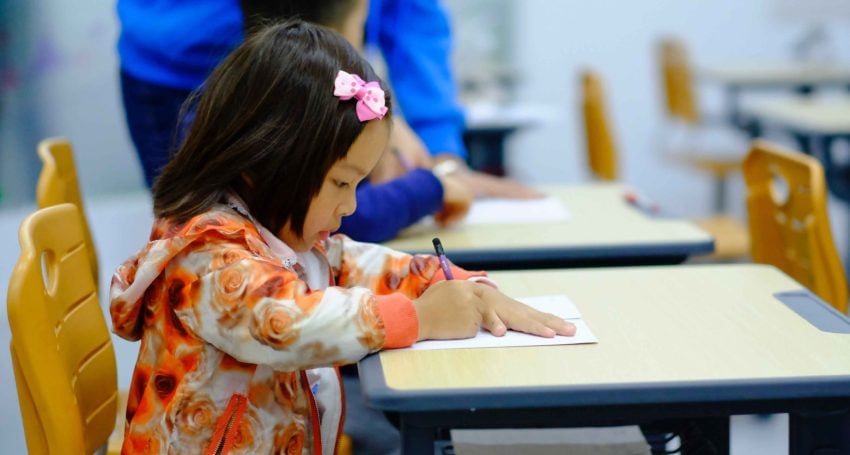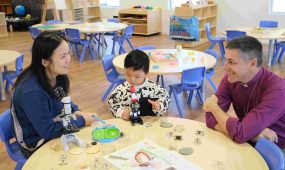Tips for managing the start of school in 2020
News
To help parents and guardians manage the transition as smoothly as possible, Anglicare’s Mental Health and Family Wellbeing team have put together their top tips for starting school

Whether your child is starting school for the first time, or returning for the next chapter in their educational journey, the start of the school year can be an anxious and draining time for the whole family.
To help parents and guardians manage the transition as smoothly as possible, Anglicare’s Mental Health and Family Wellbeing team have put together their top tips for starting school.
Anglicare Service Coordinator Alecia Williamson said parents and guardians had a crucial role to play in helping children adjust to the school environment.
“It’s really important that parents don’t think they can just rely on teachers to help their little ones adjust and feel comfortable,” she said.
“Children – especially those of prep age – are like sponges. They pick up on the moods and demeanor of the adults around them, so it’s really crucial to be self-aware, calm and consistent, especially in the next few weeks.
“Even small changes in what we say or do at home can have a huge impact on how children perceive the school environment and even their relationships with classmates and teachers.”
Ms Williamson said parents and guardians should make a conscious effort to speak positively and with enthusiasm about going to school.
“Be positive and share your own stories. But also don’t skirt around the issue of being anxious. Talk about times when you were worried and what you did to overcome it – you really are your kid’s most important teacher,” she said.
Tips for starting Prep
Ms Williamson said Anglicare runs regular programs with families who have little ones starting Prep and also speaks to a lot of teachers about what they experience.
“Teachers are telling us that while reading and writing skills are important, there are some very basic skills that will make a big difference to how Preps adjust,” she said.
These include being able to:
- Hold a pencil, zip up their bag, take their shoes off and put them on
- Recognise their belongings and name
- Put their own things away
- Chat with other children
- Sit on the mat for short periods of time for story time
- Go to the toilet by themselves
“These things seem simple to us, but for a Prep student in a new class with other kids they don’t know, they can quickly become overwhelmed.”
Involve them in the preparation
“By getting them involved they have some choice and control over the change that is occurring, it also allows for conversations about school. A good way to do this is to get them to go shopping with you to choose their bag and shoes, try on uniforms.
If you really can’t face the idea of the back-to-school shopping as a family group, then let them have a look online beforehand.”
Tackling lunchtime
“Let your child help pick their lunchbox and drink bottle if you can. Pick one that is suited to your environment, and insulated in areas where it is hot is always a good idea. Talk to them about what they like for lunch and even consider creating a menu so you can rotate through ideas and they don’t get bored!
“Get them involved in packing their lunches and making their food – it gives them responsibility but they are choosing their lunch so you know they like it.
Advertisement
“When thinking about lunches think about how active they are, are they are a talker, do they get bored easily, do they eat a little or a lot, can they open packets and containers, what stores well?
“They need enough protein and energy to keep going all day so a balanced lunchbox is important, remember to check sugar labels as it’s often higher than you think.
“If you have a busy schedule or mornings/evenings are tough think about what you can make ahead of time and store in the fridge or freeze and defrost.”
Sticking to a routine
Ms Williamson said consistency was the key and setting an achievable family routine would make the transition to school easier for the entire family.
“After the holidays it is hard work for everyone, but a routine makes a big difference and the earlier you start the better,” she said.
“Have a smaller routine individualised for each child and consider using age-appropriate pictures showing the child doing the task.
“Look at what can be done the night before, such as bag packing or laying out clothes or packing lunches and always get the kids involved whenever you can.
Advertisement
“Start having conversations about heading back – what are you looking forward to, what is your favourite thing at school, friends, etc? Take a tour of the school with your child and try to understand their concerns and consider how you they can address these.”
“It is also a tough time financially for many families, so see if you can save on uniforms. If uniforms are costly check the school policy – can you get plain shirts, hats, shorts and skirts in the school colours? Is there a second-hand uniform shop or are there second-hand uniforms being sold in your local Facebook group?”
Monitoring how they’re going
Ms Williamson said once a child was back at school, it was also important monitor how they are going.
“When school goes back, prepare for kids to be tired in the first couple of weeks. Bed times and good food will be important,” she said.
“It’s also important to ask open-ended questions to monitor how they are going. Instead of asking ‘how was your day?’ ask questions like:
- What was your favourite thing that happened today?
- What happened today that you wish hadn’t happened?
- Are there any rules that are hard to follow?
- What subject was the most interesting today?
- What was something new you read today?
- Did anyone do something nice for you today?
- Did you do something nice for anyone?
- What are you looking forward to tomorrow?
- What is your favourite part of class?
- Did you learn anything new today?
- What made you feel good today?
- If you could change one thing about today what would it be?”
Download the Anglicare ‘2020 getting ready for Prep checklist‘.
About Anglicare: Anglicare Southern Queensland is a member of the Anglicare Australia Network and is one of Queensland’s most trusted social welfare organisations. It is a not-for-profit charity delivering a broad range of community services, including homelessness support, mental health and family counselling, foster care and aged care. One in every 30 Queenslanders is empowered by Anglicare Southern Queensland.





